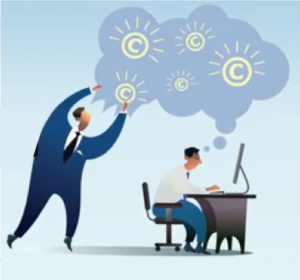The Internet is an Honor System. Now, All We Need Is Honor.
 If you read this blog, you know that valuing and protecting original content are topics we are passionate about.
If you read this blog, you know that valuing and protecting original content are topics we are passionate about.
Last week, the vexing issue of content piracy once again reared its ugly head in the blogosphere. And this instance was a real shocker.
In this case, a Fortune 100 company (Verizon) was the pirate, and Mark W. Schaefer, the author of a popular business blog, and Kerry Gorgone’s guest post, the targets.
In case you missed it, you can read about the details on Mark Schaefer’s blog {grow}, and in this column from Ragan Media.
They Should Know Better
You may be asking: Why wouldn’t Verizon, or any big company, just license Mark’s content in a legal way?
Content piracy happens for a few reasons. Sometimes, an individual naively fails to ask permission to reuse or excerpt content, due to ignorance of copyright and fair use. Sometimes, it’s due to a content scraper purposely stealing others’ content to drive traffic to questionable commercial websites.
BUT: When a Fortune 100 company acts so unethically, it is particularly shocking. At the risk of stating the obvious:
- Verizon is a large commercial enterprise. It can afford to license original content and should set the standard for lawful reuse of digital content – not ignore copyright laws.
- Content is NOT free. Creators are entitled to be compensated and credited for their work.
What’s truly unfortunate is that this is not an isolated situation. As Mark Schaefer stated, “I used this company as an example, but Verizon is certainly not unique or alone.”
Clearly, there is a much bigger issue here, and it will take a commitment by ALL of us to address it.
Content Piracy: “We have met the enemy, and they are us.”
I am reminded of the classic line from the classic cartoon, POGO: “We have met the enemy, and they are us.”
Web publishing has spawned an Internet culture that accepts the practice of taking content improperly. It’s far too easy to copy and paste, or take a screen grab and use it without attribution, and that has created some really bad attitudes and habits.
Each of us — B2B, B2C, big blogger, small blogger, big company, small company — has to examine and take responsibility for our individual practices surrounding the use of other people’s content.
- Whenever you republish someone else’s content, be sure to get explicit permission to do so, and provide attribution according to the owner’s specifications.
- Whenever you excerpt or curate, be sure your excerpts are within the bounds of fair use and be sure to attribute the source.
This should be standard operating procedure, no matter who you are. Stealing content is wrong, and just because you may get away with it, doesn’t mean you should.
What Else Can Be Done? Technology Can Help
iCopyright’s mission is to create legal and profitable options for content reuse and to discourage content theft.
For instance, our free Toolbar enables bloggers and web publishers to give instant permission to reuse and republish their content under terms they establish, and comes with a premium service that detects content theft and copyright infringement. On the flip side, content curators can find relevant content, and legitimately post excerpts, or even entire articles with permission, from the repubHub content portal.
Yes, these tools and technology can make content sharing easy and legal. But to stop egregious acts like Verizon’s, as well as the badly mistaken, but widely accepted, idea that any online content is there for the taking, is a different matter.
In the final analysis, the Internet operates on an honor system — and that requires people and companies to behave honorably!
What are your experiences with content piracy?
Please share your thoughts about how we can combat these practices – including links to posts you’ve written on the topic — in the comments.
Free eBook: Learn from Your Publishing Peers!
Download our eBook filled with content strategies and insights from online editors, bloggers and content marketers on the cutting edge.